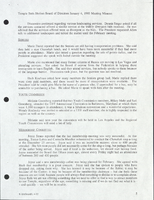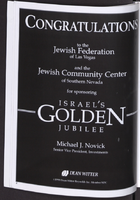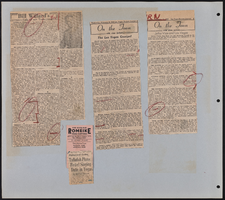Search the Special Collections and Archives Portal
Search Results

Transcript of interview with Marianne Carpenter by James D. Campbell, March 02, 1977
Date
Archival Collection
Description
Text

Transcript of interview with Don Eckert by Robert A. Kamp, March 15, 1981
Date
Archival Collection
Description
On March 15, 1981, Robert A. Kamp interviewed Donald (Don) L. Eckert (born 1953 in Las Vegas, Nevada) about his experiences while living in Nevada. Eckert first explains the geographical boundaries of Las Vegas when he was first born and the types of recreation in which both youth and adults would take part. Eckert then discusses the Helldorado events and how they have changed over the years before describing how the University of Nevada, Las Vegas has changed as well. The interview then shifts to the topic of Eckert’s college major, hotel management, and then to a brief discussion about the MGM fire. Eckert also talks about horse racing in Las Vegas, changes in gaming, the Basic Magnesium plant, and the development of Mount Charleston. The interview concludes with Eckert’s thoughts on the legalization of gambling in other states and how that trend relates to the future of Las Vegas.
Text

Interview with Robert Elmer Friedrichs, August 27, 2004
Date
Archival Collection
Description
Text

Minutes from Temple Beth Sholom Board of Directors meetings, January 1993 - June 1993
Date
Archival Collection
Description
Meeting minutes include reports from committees of the board, correspondence, and balance sheets.
Text

Transcript of interview with Arby Hambric by Claytee D. White, September 23, 2015
Date
Archival Collection
Description
Arby L. Hambric's book entitled, "To Thee I See: From picking in the fields of Texas to cooking for dignitaries on U.S. Navy ships, a journey I wouldn't change," describes his profound journey from working in the cotton fields as a child to being drafted into the U.S. Navy, before completing high school. During this interview, he recalls the significant achievements of the "Red Tails" and the Tuskegee Airmen. Beginning his 20 year Navy career before military integration, Arby describes the racial tensions that plagued the U.S. Navy in the 1940s, and discusses how he was able to successfully navigate that racist environment for two decades and three war eras. Arby enrolled in San Diego State College after leaving the U.S. Navy. He also worked as maintenance personnel for Sears and Roebuck and started a catering business with his wife. He became a member of the Southern Nevada Enterprise Community, SNEC Board upon moving to Las Vegas, Nevada, after his wife died. With a family legacy he can be proud of, Arby highlights the achievements of his great grandson Taquan Mizzell, a Virginia Cavaliers running back at the University of Virginia. As a Navy veteran, Arby often volunteered his time and resources to help others in need. He recalls driving the sick and elderly back and forth from the Westside community to Valley Hospital or University Medical Center, UMC. He also discusses government enforced road closures and a wall that was built to block Blacks from entering the new downtown. This interview sheds new light on military integration and offers key strategies for overcoming environmental racism. Arby mentions a documentary about the closing of the wall and offers his predictions on the future of the Westside.
Text

Interview with Peter Henry Zavattaro, May 31, 2005
Date
Archival Collection
Description
Text




